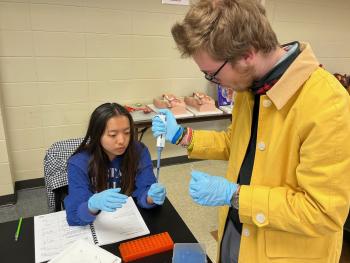Biology Research Class Gives ChattState Students Hands-On DNA Research, Gene Editing Experience
June 3, 2024 | Payton Potter | Student Success

CHATTANOOGA, TN – One biology course is giving some Chattanooga State Community College students a unique opportunity to gain hands-on experience studying molecular genetics by extracting and analyzing DNA in a laboratory setting.
Titled Biology 2900, the course builds on concepts learned in introductory biology classes to allow students to research topics of their choosing. Examples include using polymerase chain reaction (PCR), and DNA sequencing to investigate possible fish fraud, which is the intentional or unintentional labeling of fish as a different type of fish.
The course was created by Dr. Evelyn Mobley, Professor and Lead Teacher for Anatomy and Physiology; David Wollert, Associate Professor of Biology; and Dr. Michael Watterson. It is based in High Impact Practices (HIPs), which prioritize hands-on learning, critical thinking, and research.
Wollert said the class’s original design involved studying the functionality of gene promoter sequences in bacteria. While the curriculum helped students gain hands-on laboratory experience, professors feared students struggled to connect what they learned to real-world applications.
The professors adjusted the curriculum, focusing instead on collecting samples of fish from local restaurants and markets and analyzing them to see if they were as advertised.
“The project teaches them a good set of molecular genetics lab skills,” Wollert said. “It also seems incredibly relevant and applied, so we've done that project with them for the past three years.”
With so many species of fish that taste and look the same, mislabeling of fish can occur by accident or intention. The undergraduate research class explores this issue by analyzing a variety of raw fish samples obtained from local markets and restaurants. Students extract DNA from the samples, amplify a mitochondrial gene suitable for species identification using Polymerase Chain Reaction (PCR), sequence the gene, and then identify the fish from a database of known DNA sequences. They then present their findings to their peers and faculty members, connecting practical biological skills to analytic and communication skills.
Dr. Mobley said the course provides students with a practical look at biology that isn’t always attainable in classroom lectures.
“For most of our students, it whets their appetite for research and encourages them to think about science in a way you don’t necessarily see,” she said. “We’ve had some surprising results since we started doing the fish project.”
Throughout the project, students have identified iridescent shark meat mislabeled as whitefish and found channel catfish in a supposed can of tuna. Students have also blind-tested and successfully identified other samples including wild boar and bison.
Later in the semester, students also use CRISPR technology to edit genes in E. coli bacteria.
“It’s a unique thing that some community college students are getting to literally do cutting-edge gene editing projects,” Wollert said.
Dr. Karen Eastman, Dean of Math and Sciences, said taking Biology 2900 changed some students’ career trajectories.
ChattState graduates who took the class have engaged in research fellowships at Stanford University and the University of Tennessee at Knoxville. Another obtained a biology degree and graduated with honors from the University of Tennessee at Chattanooga.
The impact of the course can be seen in more ways than academic achievement alone, Wollert said. One student got a strand of RNA tattooed on her leg, saying it was inspired by the class.
Dr. Mobley said the course imparts students with hard and soft skills they will use as they continue their education and enter the workforce, including making conversions, pipetting on a very small scale, and communicating complicated concepts to peers.
Of the 45 students who have taken this course so far, 24 have graduated from ChattState. Of those, 18 transferred to universities across the country, including Arizona State University and the University of Mississippi. One student then went to dental school at Lincoln Memorial University, and another went on to study medicine at Baylor University.
If the class sounds interesting, that’s by design.
“I told Dr. Mobley, ‘Let’s build the class we wish we could have had,’” Wollert said.
